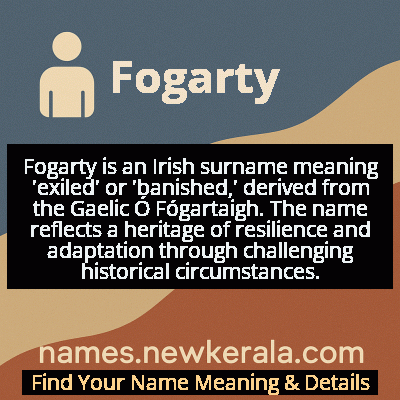Fogarty Name Meaning & Details
Origin, Popularity, Numerology Analysis & Name Meaning of Fogarty
Discover the origin, meaning, and cultural significance of the name FOGARTY. Delve into its historical roots and explore the lasting impact it has had on communities and traditions.
Name
Fogarty
Gender
Male
Origin
Irish
Lucky Number
2
Meaning of the Name - Fogarty
Fogarty is an Irish surname meaning 'exiled' or 'banished,' derived from the Gaelic Ó Fógartaigh. The name reflects a heritage of resilience and adaptation through challenging historical circumstances.
Fogarty - Complete Numerology Analysis
Your Numerology Number
Based on Pythagorean Numerology System
Ruling Planet
Moon
Positive Nature
Diplomatic, friendly, artistic, empathetic.
Negative Traits
Over-sensitive, moody, indecisive, prone to self-pity.
Lucky Colours
Green, cream, white.
Lucky Days
Monday.
Lucky Stones
Pearl, moonstone.
Harmony Numbers
1, 3, 4.
Best Suited Professions
Diplomats, mediators, caregivers, artists.
What People Like About You
Cooperative spirit, friendliness, artistic talent.
Famous People Named Fogarty
Michael Fogarty
Roman Catholic Bishop
Served as Bishop of Killaloe for 47 years and was a prominent figure in Irish Catholic history
John Fogarty
Musician
Lead singer and guitarist for Creedence Clearwater Revival, Rock and Roll Hall of Fame inductee
Thomas Fogarty
Surgeon and Inventor
Pioneered cardiovascular surgery techniques and invented the Fogarty catheter
Patrick Fogarty
Educator
Founded the first vocational high school in Ontario, Canada, which now bears his name
Name Variations & International Equivalents
Click on blue names to explore their detailed meanings. Gray names with will be available soon.
Cultural & Historical Significance
During the Cromwellian and Penal Law periods, many Fogartys faced land confiscation and religious persecution, reinforcing the 'exiled' connotation of their name. The name represents the resilience of Irish families who maintained their cultural identity despite political oppression and displacement. In the 19th century, many Fogartys emigrated during the Great Famine, spreading the name throughout the English-speaking world while maintaining strong connections to their Irish heritage. Today, the name continues to symbolize the enduring spirit of Irish cultural identity across generations and continents.
Extended Personality Analysis
Individuals bearing the Fogarty name are often perceived as resilient and independent, characteristics that align with the name's meaning of 'exiled.' They tend to possess strong survival instincts and adaptability, able to thrive in challenging circumstances. Historically, this translated into a reputation for being self-reliant and determined, with a fierce loyalty to family and community. Modern Fogartys often exhibit these same traits through entrepreneurial spirit, creative problem-solving, and the ability to reinvent themselves when faced with adversity.
There's also a strong intellectual tradition associated with the name, with many Fogartys demonstrating keen analytical abilities and a love for learning. This combination of resilience and intellect makes them natural leaders who can navigate complex situations while maintaining their core values and principles. They often display a quiet confidence rather than overt assertiveness, preferring to lead through competence and reliability. The historical association with exile has also fostered in many Fogartys a deep sense of empathy for outsiders and underdogs, making them particularly effective in advocacy and humanitarian roles.
Modern Usage & Popularity
In contemporary times, Fogarty remains primarily a surname rather than a given name, though it occasionally appears as a first name in Irish-American communities seeking to honor family heritage. The name maintains strong associations with Irish identity and is most commonly found in Ireland, the United States, Canada, Australia, and the United Kingdom. While not among the most common Irish surnames, it has maintained steady usage patterns over the past century with a slight increase in recent decades due to growing interest in ethnic surnames. In professional contexts, the name carries a distinguished quality, often associated with medical and academic fields due to prominent Fogartys like Dr. Thomas Fogarty, inventor of the Fogarty catheter. Modern bearers frequently work in education, healthcare, law, and creative industries, with many maintaining active connections to Irish cultural organizations and genealogical research.
Symbolic & Spiritual Meanings
The Fogarty name symbolizes resilience in the face of adversity and the ability to maintain cultural identity through displacement and change. It represents the broader Irish diaspora experience—carrying one's heritage while adapting to new environments and circumstances. The 'exiled' meaning evokes powerful themes of journey, transformation, and the eternal search for belonging and home. Symbolically, it speaks to the human capacity to create community and meaning wherever one lands while honoring ancestral roots and traditions. The name also carries strong connotations of intellectual pursuit and historical consciousness, reflecting the clan's traditional roles as scholars, poets, and keepers of collective memory. In contemporary interpretation, Fogarty represents the universal human experience of navigating change while preserving identity, making it an enduring symbol of cultural endurance, personal transformation, and the strength that emerges from overcoming displacement and challenge.

